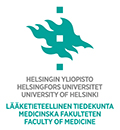 Yliopistomme suunnitelmassa uudeksi strategiaksi on mukana kolmikielielisyys. Tähänkin asti kolmas kieli eli englanti on ollut näkyvästi mukana yliopiston viestinnässä. Yliopiston sivuilta voi valita minkä tahansa näistä kolmesta kielestä yliopiston uutisten lukemiseksi ja byrokratian hoitamiseksi. Tämän on tärkeätä, jotta Helsingin yliopiston eriomaisuudesta tulevat tietoiseksi myös kansainväliset tahot ja että (vielä) suomea tai ruotsia taitamattomat yliopistoomme hakeutuneet työntekijät pystyvät hoitamaan asioitaan yliopiston suffelissa, solessa, tutossa ja muissa asiointikanavissa.
Yliopistomme suunnitelmassa uudeksi strategiaksi on mukana kolmikielielisyys. Tähänkin asti kolmas kieli eli englanti on ollut näkyvästi mukana yliopiston viestinnässä. Yliopiston sivuilta voi valita minkä tahansa näistä kolmesta kielestä yliopiston uutisten lukemiseksi ja byrokratian hoitamiseksi. Tämän on tärkeätä, jotta Helsingin yliopiston eriomaisuudesta tulevat tietoiseksi myös kansainväliset tahot ja että (vielä) suomea tai ruotsia taitamattomat yliopistoomme hakeutuneet työntekijät pystyvät hoitamaan asioitaan yliopiston suffelissa, solessa, tutossa ja muissa asiointikanavissa.
I am not sure why the sweet term “suffeli” was chosen to guide us to the new portal. I thought Suffeli is a candy made of milk chocolate, waffle and toffee, or taffy in American English. It was introduced in 1966. So, maybe it was chosen to brand the fresh radicalism of the university. I am also not sure why the alumni letter (in Finnish) is called THINK LETTER and I am invited (in Finnish) to THINK CORNER. If the branding team had difficulties in finding terms that would ring the bell in all three languages, so why not do something really radical and choose Latin expressions that would be an equal puzzle to the speakers of Finnish, Swedish, and English. It would also give us an opportunity to learn Latin particularly now that the only internationally acknowledged Finnish radio channel Nuti Latini Radiophoniae Fennicae Generalis was closed last June after 30 years of service with these words: Auscultatoribus, quorum grex ad omnes orbis continentes amplificatus est, propter fidelitatem gratia squam maximas agimus et valedicimus.
Since the end of the second world war, English has been the new lingua franca, also in science. It has given us a means to communicate with the rest of the world. It has also been a huge advantage to those who speak English as their first language and a way to promote the Anglo-American culture. It has made the rest of the world invest a lot of effort in learning good enough written and spoken English. This journey to sufficient command of English will now begin at our schools earlier than ever before. The university organises courses in scientific writing and provides language services for researchers. This is important as the editors (whose mother tongue is usually English) find it hard to take a scientific article seriously if the grammar is not impeccable. Learning many languages, however, has also many benefits: it is fun, it opens doors to new cultures, and builds new connections in the brain.
I like to learn languages and communicating in English in research groups with members who do not command either Finnish or Swedish, is absolutely fine. However, I was rather upset at our last professors’ and teachers’ morning meeting when someone in the audience demanded “in English, please”. This request was made by the only non-Finnish speaker out of over a hundred present, but this request was obediently fulfilled and we were all obliged to speak English. I think this is wrong. It is wrong to the person who should be given an opportunity to learn Finnish. It is unfair to us who cannot use our mother tongue in discussions about the dire financial situation of the university, the new strategy that embraces the whole world and beyond, the new specialist medical education or where the reform of the social and welfare system may be heading for. Also, all are not familiar with the special administrative terminology in English, the vocabulary of everyman’s English is limited, and some have a high threshold for speaking English and opt to remain silent.
Det som var skärskilt olyckligt under förra veckans morgonkaffe med professorer och lärare var att vi firade svenska dagen genom att byta från finska till engelska i stället för till svenska. Vår fakultet är tvåspråkig och det vore fint att hålla morgonmötet åtminstone en gång i året på svenska. Dessutom borde de som har svenska som sitt modersmål kunna använda det på alla våra möten. Universitetet och fakulteten satsar mycket i svenskspråkig undervisning. Det är viktigt om vi vill behålla den finlandsvenska kulturen levande i Finland och erbjuda service för svenskspråkiga patienter på deras modersmål. Det är också viktigt för det skandinaviska samarbetet, inte bara inom forskningen, som ser ut att bli allt viktigare i den turbulenta världen. Att använda svenska i den normala växelverkan skulle skänka tröskeln att tala svenska och bibehålla kunskapen i svenskan även hos dem som inte talar svenska som sitt modersmål. I stället för “in English please” hoppas jag att det oftare blir “på svenska, tack”.
Toivon, että kolmikielinen yliopisto ei tarkoita sitä, että vaikenemme kahdella kotimaisella kielellä ja puhumme jatkossa vain keskinkertaista englantia. Jag hoppas att det trespråkiga universitetet inte betyder, att vi kommer att tiga på både inhemska och tala bara slätstruken engelska.
Eija Kalso
Professori, ylilääkäri
Helsingin yliopisto ja HUS
